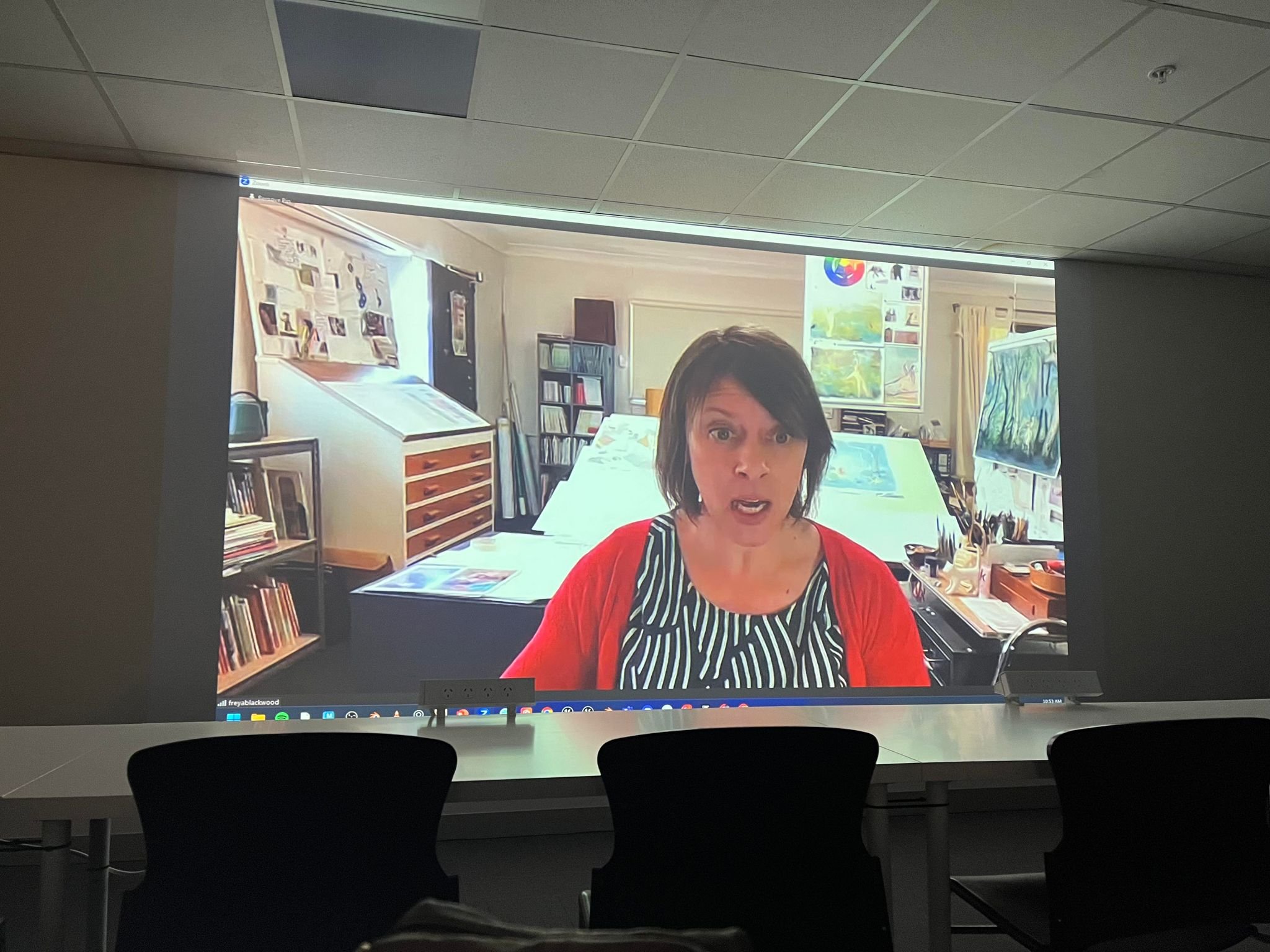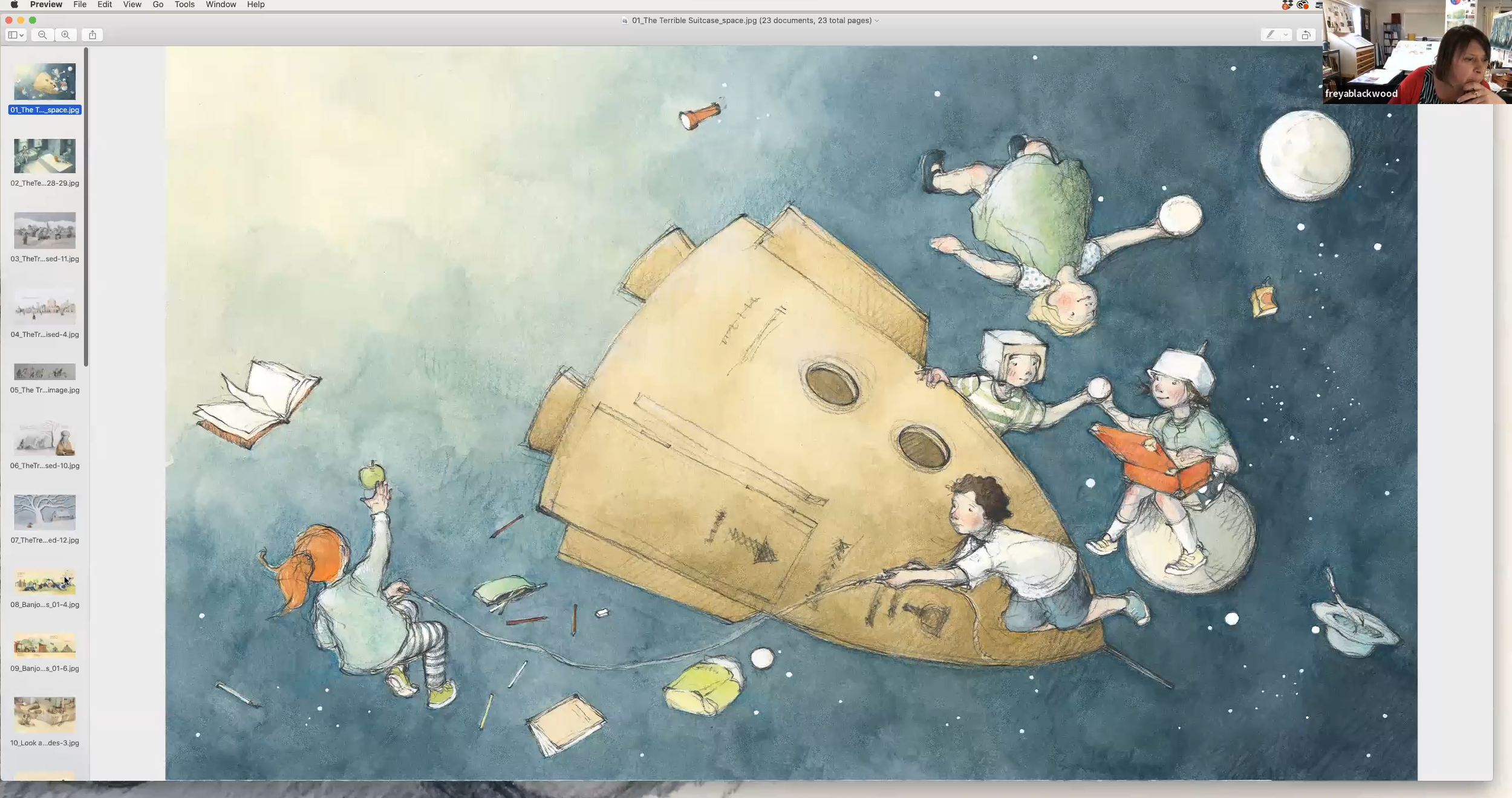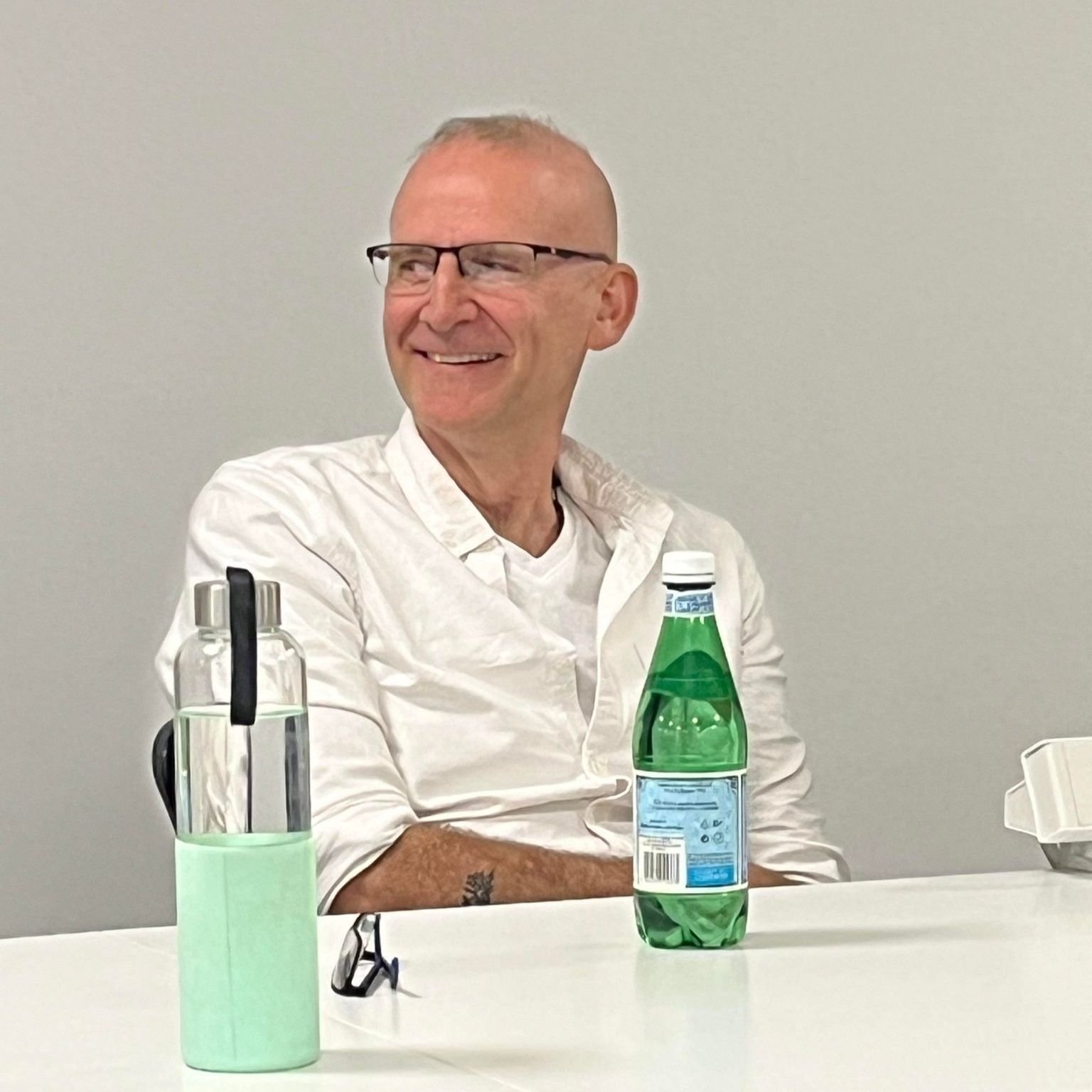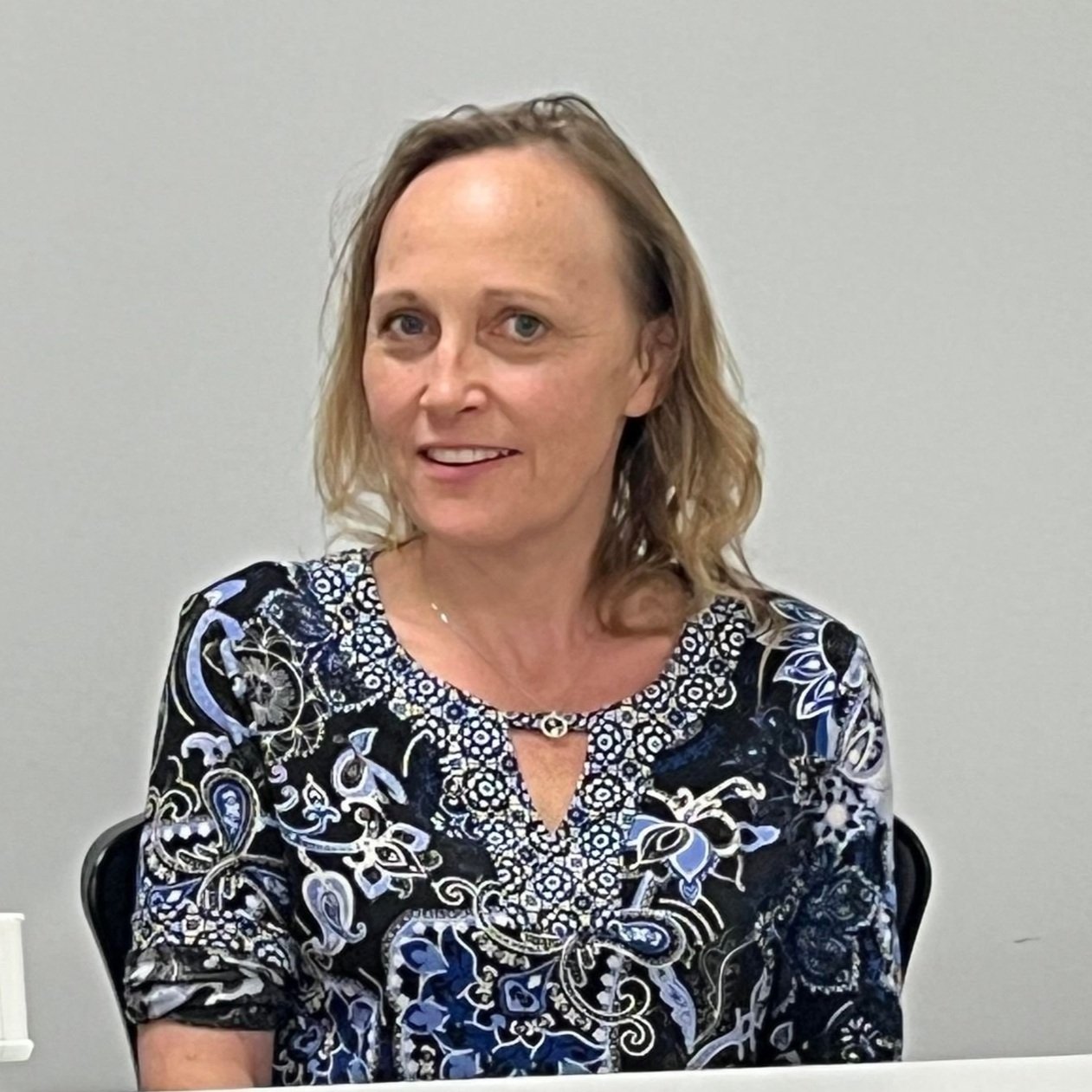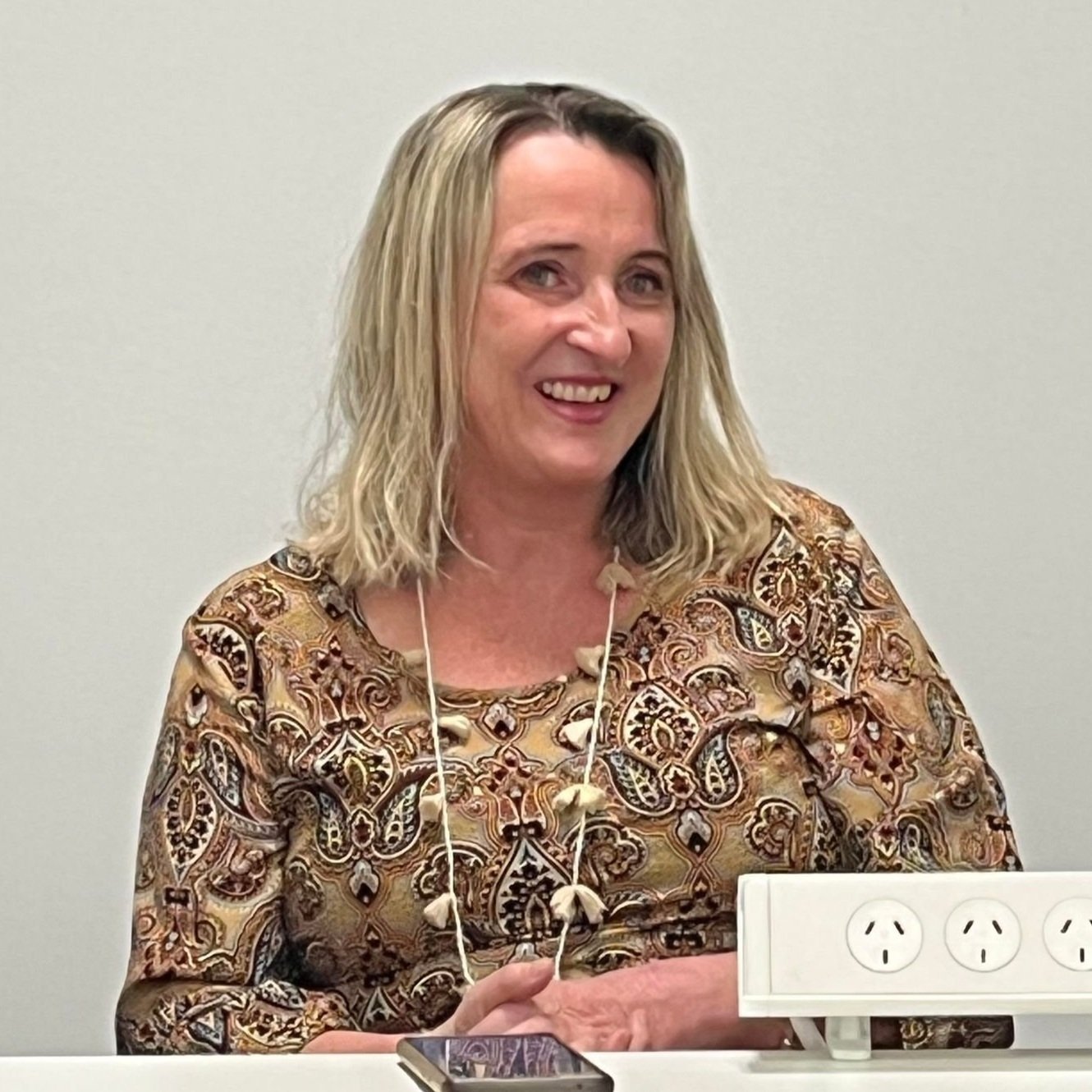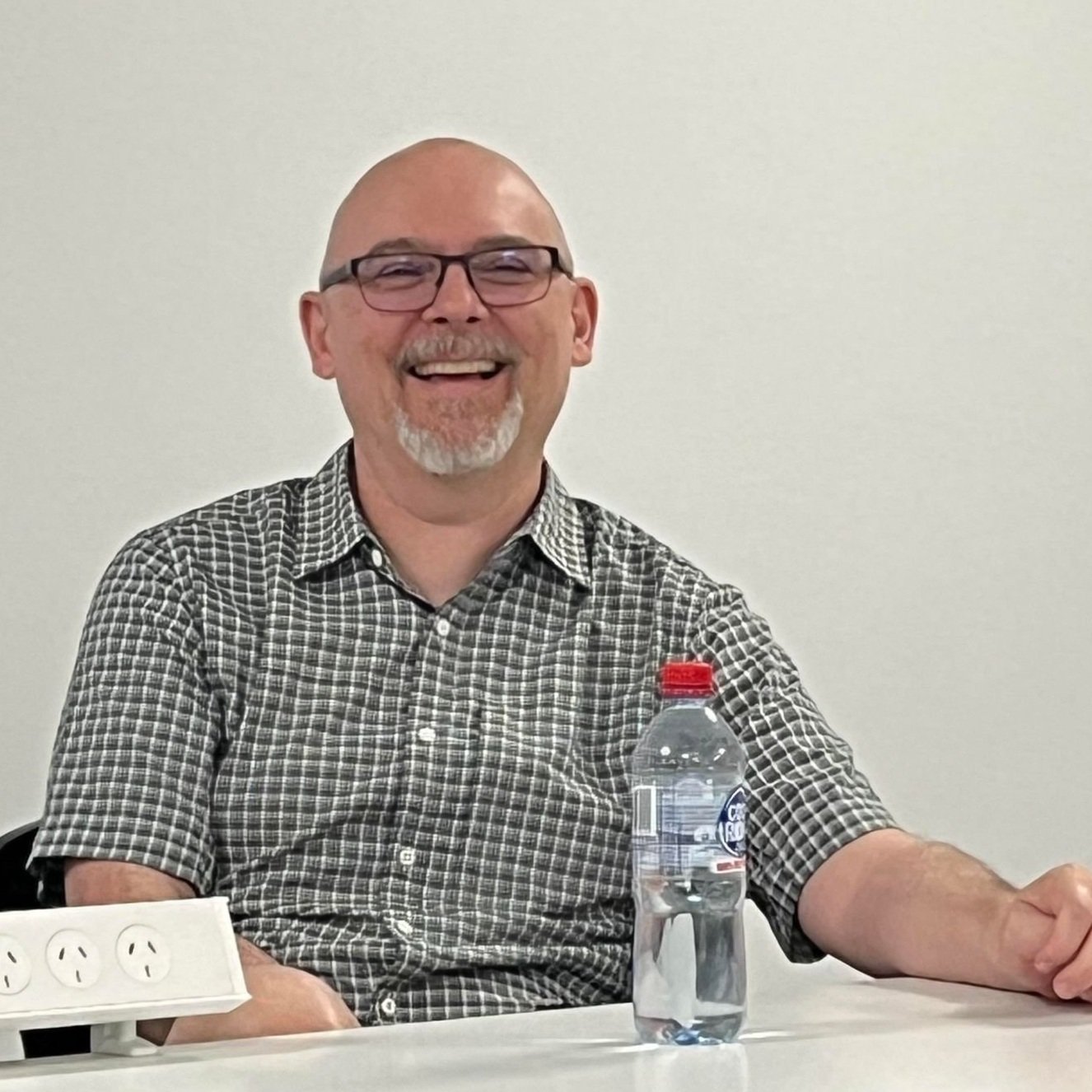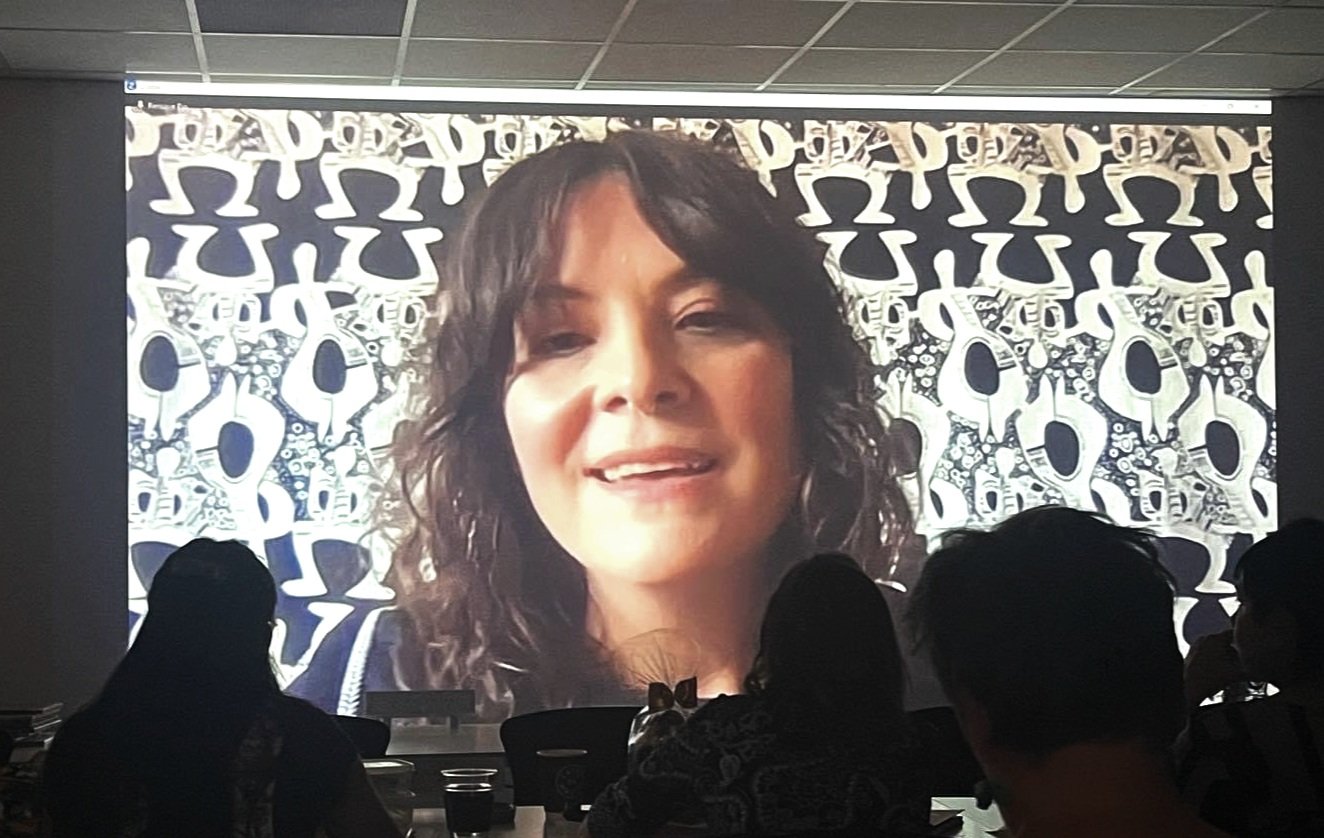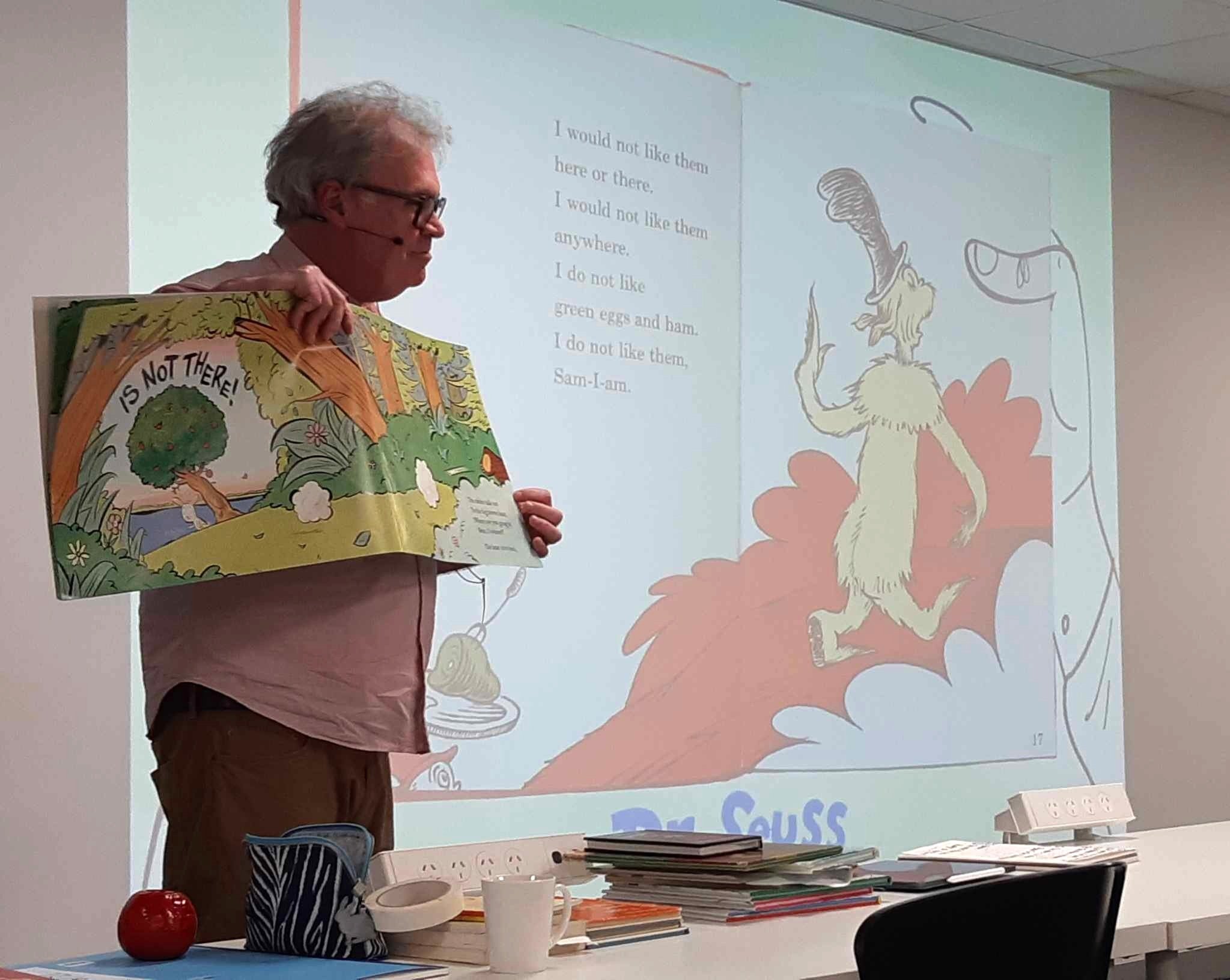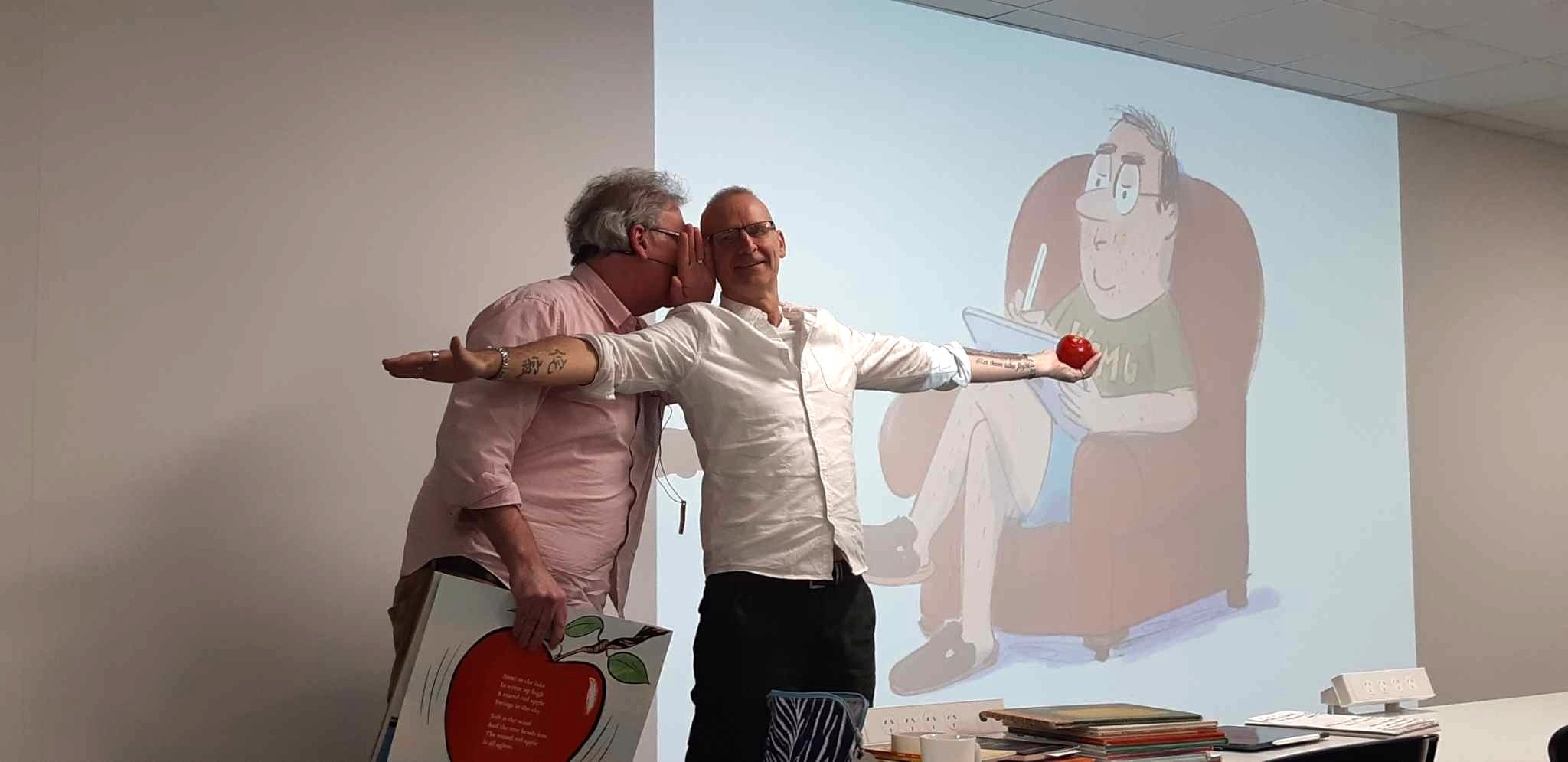The SCBWI SA Professional Day was once again held in CDW Studios in Adelaide’s CBD. It was a fantastic day of networking, inspiration and learning. It was also lovely to see so many new members present.
Freya Blackwood, picture book illustrator, in conversation with Mandy Foot
Freya Zoomed in from her studio in Orange. She gave a very open, insightful talk about her life as an illustrator. We felt like we were having an in-person chat, even though she was just up on the screen. Many commented afterwards about how someone so amazing could be so humble.
Freya told us about how she fell in love with illustration as a kid, described some of the jobs she has had besides book illustration (some tedious and depressing), and how her mum, a TAFE art and design teacher, has passed on her knowledge (whether Freya wanted it or not).
Freya now works on one or two books a year. She only illustrates books that she’s in love with and told us how the book she’s currently illustrating still gives her goosebumps each time she reads it. In describing her style, she said she isn’t a perfectionist and aims for her work to be messy.
Some of Freya’s observations included that she has made a lot of bad decisions in her life, but it all ended up okay. And that sometimes saying “I’ll give that a go” leads to a job.
Some advice she gave us is that while she’s regretted not pushing back when she’s asked to change things, you have to choose which battles are worth fighting. Also, if you can find yourself an editor within the publishing house that you can communicate with on a regular basis it’s so much easier.
Freya doesn’t think there is a better job than illustrating children’s books, but admits that it’s hard work and you don’t make much money in this industry. She feels lucky we have PLR and ELR, which helps her to live by her income as an illustrator, but she worries that she doesn’t have superannuation.
A final piece of wisdom she gave us is, “A good balance is important in all things.”
Panel on middle grade and young adult novels, chaired by Adam Cece, with authors Charlie Archbold, Beverley McWilliams, Mike Lucas and Sean Williams
Adam spent a large portion of the session introducing the talented authors on the panel and letting us know about their many books and awards. The humble authors sat there trying not to look too embarrassed by the praise. Here are a select few of his questions and the panellists’ paraphrased responses.
Question: Have you always wanted to be an author? When did you get bitten by the middle grade bug?
Mike has always wanted to write, demonstrated by the fact that at age 11 he asked for a thesaurus for his birthday. He has been writing poems since he was 8 and has been writing for kids since his children were young.
Sean has always loved reading. His parents had a lot of books, and let him read any book he liked; as long as he could hold it, he could read it. He has written adult novels, but now only writes middle grade and YA.
Beverley wanted to be a lawyer and earn lots of money. She wrote a novel when she was 12 and wrote a murder party as a teenager. Writing was always there, but she ignored it and followed the money. As a parent she started writing and now she could never go back. “Who wants money anyway?”
Charlie studied drama and wrote radio plays, and then 10 years ago she took time off work and committed to writing her first novel, the award winning Mallee Boys.
Question: Are you writing for the 12 or 15 year old you?
In short, everyone said yes, though Sean said he is also writing for adult him (and he’s a little bit older than 15!).
Question: What is the biggest change since you’ve moved from an aspiring author to a professional author?
Charlie is more confident to write, and has her own voice. She feels only she can tell her stories.
Mike says that you know it is possible to get your writing published, but he still has imposter syndrome.
Sean told us how his goal posts keep shifting. Once you reach your goal, the goals change, so you are never happy. He will never feel like he’s arrived, but as soon as he does, he will give up.
Beverley simply liked being called a professional.
Question: How do you not write the same character over and over again?
Mike said to give your character a past. He thinks children’s characters are more diverse than adult characters.
Beverley chooses different species; her characters have been a reindeer, pigeons and now she’s writing a novel about an elephant. However, in her pigeon novel, Spies in the Sky, she has 5 pigeons with distinct personalities, helped by giving them all backstories.
Charlie mentioned how in writing her next Sugarcane Kids novel, she is also looking at what the characters want for the future.
Sean tries to make the characters interesting to him so he doesn’t get bored.
Alyson O’Brien, Publishing Director at Little Book Press (Raising Literacy Australia) in conversation with Mandy Foot over Zoom.
Alyson gave us an insight into her new role as publishing Director at Little Book Press, which is the publishing arm of Raising Literacy Australia, a not for profit organisation that promotes literacy. She has come from a bigger trade publisher (Hardie Grant) and is now busy getting things up to speed. She has so many big ideas she wants to get to, but has many other little things she needs to do. She told us she is now running the publishing house as a commercial house to make money for the charity and has obtained a distributer, Affirm Press, so now the books will reach so many more avenues than just the books in the book packs (for newborn babies and preschool children). She is planning to publish books that are trade only and not for the book packs. In the past LBP published 6 books a year, now she would like to publish 10 to 12 books a year. She says she is there to make LBP viable without the funding for the book packs, and also she wants to grow the profile of both LBP and RLA.
Alyson is always looking for manuscripts, always reading manuscripts, and always looking for new artists. She only wants SA creators for the SA book packs, but is now also looking at Australian creators for the other books. She has the unsolicited guidelines on the webpage, which are easy to follow. If you don’t hear back in three months, then unfortunately it’s a no, though she is a little behind so it might take longer to hear a yes.
In manuscripts, she looks for good language and good pace, how it reads out loud, how pleasing it is, and whether it’s an engaging story. She says that while LBP is becoming more commercial, she isn’t going to start publishing books about farts! Children need to have the best possible stories to be reading. If a book moves her and excites her, then she feels it will do that for other people too. She loves rhyme when it works, but if it’s not working, write in prose.
For illustrators, she looks not just for ability to draw characters, but also for movement, action and responding to things as well as world building.
She doesn’t want writers to write to get published, but instead says they should write because that’s what they have to do.
It was lovely to hear that she is committed to nurturing and mentoring SA creators. She wants to put money into the arts and into fellowships, including cash prizes. ‘We have nothing without authors and illustrators and they need so much more.’
Andrew Joyner, Picture book illustrator and author
Andrew usually speaks to children and starts by reading the first book he illustrated, The Terrible Plop, so decided to start this talk the same way. He even got a volunteer (Mike) to be an apple tree and to drop the apple (which is ‘the terrible plop’, if you didn’t already know).
Andrew told us about the beginning of his picture book illustration career; he was a freelance illustrator, and did illustrations for The School Magazine. Ursula Dubosarsky worked for TSM and saw his illustrations, and suggested him to her publisher, Jane Godwin. He did some samples and got the contract. He feels very lucky to have been mentored by Jane and Ursula.
He says one of the things he learnt was the importance of turning the page and the impact it makes. ‘A surprise with each page turn,’ in Ursula’s words.
Andrew sees the page like a stage and builds a theatre for his illustrations. It gets him around his problem of finding it hard to draw backgrounds. He says realism can get in the way of the action.
Sometimes he can’t work out how to draw a page. ‘If it doesn’t feel right, it’s not right.’ Though he says, do wait for the morning to see if it feels right then. Once he works out the problem page, it unlocks the rest of the book. A good publisher or editor can help you work it out too.
Even though he’s illustrated 40 to 50 books, every time he starts a book he feels like he doesn’t know what he’s doing. However, he does have more confidence that he can do it than he used to.
Andrew now does all his illustrations on his iPad in Procreate. He draws in pen in a notebook just to get his ideas flowing. Often he starts drawing simply to see what comes out.
Andrew’s fastest illustration project was The Pink Hat, which he drew in just over a month! But the book is mostly black and white, with a little bit of pink, so that made it quicker. He says he finds colour really hard.
Andrew’s final pieces of advice were to be open to collaboration and don’t be afraid to change things.
Thanks to everyone who attended for making our 2023 Professional Day so enjoyable. We look forward to seeing you at our Christmas Dinner on the 25th of November (details will be available soon).
Written by Kristin Martin

